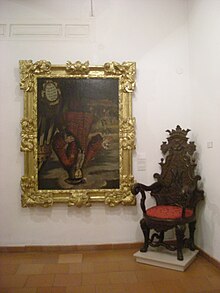Most paintings are intended to be hung in a precise orientation, defining an upper part and a lower part. Some paintings are displayed upside down, sometimes by mistake since the image does not represent an easily recognizable oriented subject and lacks a signature or by a deliberate decision of the exhibitor.
Examples
 New York City as exhibited (🔝)
New York City as exhibited (🔝) New York City in the intended orientation (🔝)
New York City in the intended orientation (🔝)
- In 1941 unfinished version of New York City, a 1942 oil by Piet Mondrian, was hung upside-down at 1945 at the MOMA of New York and since 1980 at the Kunstsammlung Nordrhein-Westfalen. After the mistake was discovered in 2022, the painting's orientation was not corrected, to avoid damage.
- Le Bateau, a paper-cut by Henri Matisse, depicts a ship reflecting on the water. It hung upside down at MOMA for 47 days in 1961.
- Georgia O'Keeffe's The Lawrence Tree (1929) depicts a tree from its foot. It hung up upside down in 1931 and between 1979 and 1989. Her Oriental Poppies hung upside down for 30 years at the Weisman Art Museum of the University of Minnesota.

- Vincent van Gogh's Long Grass with Butterflies spent two weeks inverted at the National Gallery of London.
- Salvador Dalí's Four Fishermen's Wives in Cadaquès was upside down at the Metropolitan Museum of New York.
- Pablo Picasso's 1912 drawing The Fiddler was upside down at the Reina Sofía Museum of Madrid. The representations of the head and the fiddle were confused.

- Josep Amorós's portrait of Philip V of Spain hangs upside down at the Almodí of Xàtiva [Wikidata], Spain. The king ordered the burning of Xàtiva in 1701, during the War of the Spanish Succession.
- Georg Baselitz used a painting by Louis-Ferdinand von Rayski, Wermsdorf Woods, as a model, in order to paint his first picture with an inverted motif: The Wood On Its Head (1969). By inverting his paintings, the artist is able to emphasize the organisation of colours and form and confront the viewer with the picture's surface rather than the personal content of the image. In this sense, the paintings are empty and not subject to interpretation. Instead, one can only look at them.
When both orientations are valid

Some works display rotational symmetry or are ambiguous figures that allow both orientations to be meaningful. Giuseppe Arcimboldo painted several works that are still lifes in one orientation and related portraits in the other.
See also
- Spolia (fragments of sculpture and architecture recycled in new buildings) may not be in the original orientation for ideological or pragmatical reasons. An example is the blocks in the shape of a Medusa head reused as column bases in the Basilica Cistern of Constantinople.
- Pittura infamante, a genre depicting enemies hanging from their feet.
- Aerial landscape art – Visual art depicting the appearance of a landscape as viewed from an aircraft or spacecraft
- 🔝, a symbol to show the top side of an object.
- Denny Dent, an artist who sometimes painted upside-down portraits on stage before turning the canvas right-side-up for the audience
References
- "Piet Mondrian artwork displayed upside down for 75 years". BBC News. October 28, 2022.
- Hülsmeier, dpa, Dorothea (October 27, 2022). "Mondrian: Berühmtes Bild hängt seit Jahrzehnten falsch herum". Berliner Zeitung.
- "Allemagne : le tableau "New York City 1" du peintre Piet Mondrian accroché à l'envers depuis 77 ans". Franceinfo. October 30, 2022.
- "Seit Jahrzehnten: Mondrian-Bild hängt auf dem Kopf". www.zdf.de.
- "Mondrian painting has been hanging upside down for 75 years". the Guardian. October 28, 2022.
- "Piet Mondrian artwork New York City I hung upside down for 75 years". Sky News.
- "Piet Mondrian's Painting Has Been Displayed Upside Down for 75 Years". Town & Country. October 28, 2022.
- ^ Gómez Ruiz, Lara (2 November 2022). "Este cuadro está del revés: Mondrian, Matisse y otros artistas con obras que fueron mal colgadas". La Vanguardia (in Spanish). Retrieved 2 November 2022.
- Robertson, Nan. "Modern Museum Is Startled by Matisse Picture" The New York Times, December 5, 1961
- Gohr, Siegfried. "Georg Baselitz. Kunst als Akt des Schaffens und Zerstörens. In: Detlef Bluemler". Künstler – Kritisches Lexikon der Gegenwartskunst. 18: 3ff.
- Calvocoressi, Richard (1985). "A Source for the Inverted Imagery in Georg Baselitz's Painting". The Burlington Magazine. 127 (993): 894–899. JSTOR 882264.